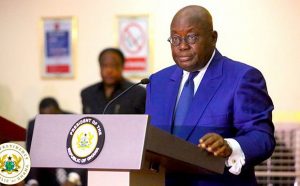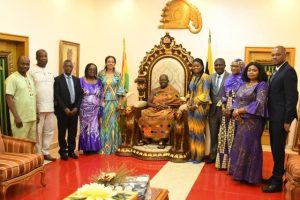Mr Charles Abani, the United Nations Resident Coordinator in Ghana, has announced a 2.3-million-dollar grant in support of the Fostering Reforestation, Environmental Sustainability and Tourism in the Okyeman Area (FOREST Okyeman).
The grant is to support biodiversity conservation in five of the 14 districts of the Akyem Abuakwa Traditional Area in the Eastern Region.
The amount is made up of one million dollars from the UN Human Security Trust Fund to implement development initiatives together with the Okyeman Environment Foundation and other stakeholders.
This will be supported with co-funding of another $1.3 million dollars from the participating UN Agencies such as the United Nations Development Programme (UNDP), United Nations Children’s Fund (UNICEF), World Health Organisation (WHO), United Nations Environment Programme (UNEP) and United Nations Volunteers (UNV) Programme (UNV) together with OEF, to address multiple development issues and provide an impetus to sustain the process.
“We acknowledge that this is a drop in the ocean however, our hope is that it will support and empower local structures to respond to some of these challenges and help leverage the opportunity to mobilize more resources. ”
Mr Abani stated on Thursday, when he led a delegation of the UN in Ghana to pay a courtesy call on the Okyenhene Osagyefuo Amoatia Ofori Panin at his Palace in Kyebi in the Eastern Region.
“Over the three-year period, the programme is expected to benefit over 1.3 million people (671,921 women and 505,907 children between the ages of 0-14 years) spanning across five out of the 14 districts in the Akyem Abuakwa Traditional Area of the Eastern Region.”
The project will support local initiative to plant three million trees over the next three years to restore degraded landscapes and create awareness on best agroforestry practices in the region.
The goal is to plant fast maturing tree species that can be harvested periodically for its economic benefits and regrown and establish renewable forestry plantations for the communities.
Mr Abani said as livelihood was a critical issue, an absence of which many were forced into illegal mining and exploitation of the natural resources, the programme would explore and establish community-based alternative livelihood interventions for youth, women and vulnerable population by piloting the Payment for Ecosystem Services (PES) mechanism in consultation with local groups, and the Okyeman Environment Foundation.
“We would build capacity of local structures to make considerable investment in the reforestation programme and manage their natural resources,” he stated.
He said this would be hinged on sustainable environmental governance and management, ecotourism, livelihoods empowerment, and the promotion of better health and education outcomes.
Mr Abani commended the Okyenhene for his active work, particularly through the Okyeman Environment Foundation, to address issues related to the environment, health and education.
Osagyefuo Amoatia Ofori Panin said climate change was real and that it was high time to act to save the earth from further destruction.
He noted that his fore-bearers knew the importance of conserving nature, that was why they prevented people from farming close to river banks and other water bodies.
With regards to mining in forest areas, the Okyenhene said: “Twenty years ago when I came on (the throne), we were talking about bauxite, I informed the Government that we don’t need bauxite exploration. This country has been mining for over a hundred years, and look at this; what we have to show is destruction, all kinds of respiratory diseases that come to our people.”
He said it was important that restrictions were put in place to protect the nation’s forest, rivers and other water bodies from degradation.
He said to ensure sustainability of the nation’s rich natural resources and biodiversity, there was a need for local community ownership in their management.
Dr Eugene Owusu, the Presidential Adviser on Sustainable Development Goals (SDGs), reiterated Ghana’s commitment towards mitigating the impact of climate change while ensuring the sustainable use of resources.
He lauded the great vision of the Okyenhene around environmental sustainability, which “deals with the essential threats that climate change poses for the world as a whole.”







